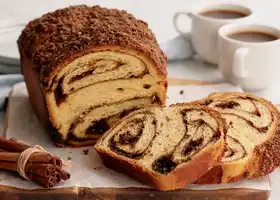Stashcook: Meal Planner & Recipe Keeper
Cinnamon Babka Recipe

Tori Avey
Bake tender, delicious homemade cinnamon-filled babka with this tested recipe and illustrated step-by-step photo tutorial.
Ingredients
2 1/4 teaspoons active dry yeast ((1 packet))
3 tablespoons granulated sugar, (plus 1 tsp for activating yeast)
2/3 cup whole milk, (warmed to 110 degrees F, plus 1 additional tbsp for egg wash)
5 tablespoons unsalted butter, (room temperature)
1 1/2 tablespoons vegetable oil ((I use canola or grapeseed))
1 1/2 teaspoons vanilla extract
4 egg yolks ((reserve 1 egg white for egg wash and 1 egg white for cinnamon filling))
2 1/2 - 3 1/4 cups all purpose flour ((flour amount detailed in instructions below))
1 teaspoon kosher salt
1 cup dark brown sugar
1/4 cup all purpose flour
3 teaspoons ground cinnamon
1/2 teaspoon kosher salt
2 tablespoons unsalted butter, (melted)
1 egg white
1/4 cup dark brown sugar
1/4 cup all purpose flour
2 tablespoons unsalted butter, (chilled and cut into small pieces)
1/4 teaspoon salt
Method
1
2
3
4
5
6
7
8
9
10
11
12
13
14
15
16
17
18
19
20
© Copyright 2026 Stashbox Ltd. All rights reserved.